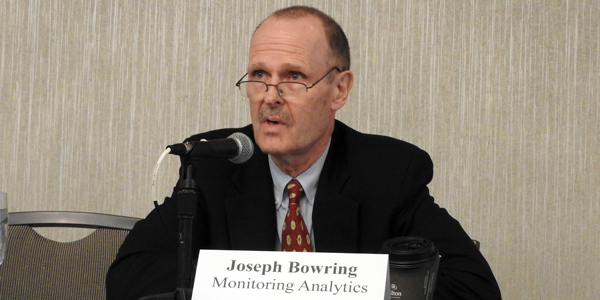By Rory D. Sweeney
FERC last week rejected a key part of PJM’s controversial proposal to reallocate uplift costs, saying it had failed to justify its plan to begin charging up-to-congestion (UTC) transactions (ER18-86).
The order addresses Phase 2 of a three-phase proposal by PJM to address how to spread the costs associated with uplift more equitably. PJM proposed allocating uplift to UTCs in the same way it is applied to incremental supply offers (INCs) and decrement demand bids (DECs). INCs receive balancing — or real-time — operating reserves. DECs, which are treated like demand, are allocated both balancing reserves and day-ahead operating reserves because they allocated equally to demand bids and exports.
UTCs aren’t allocated any uplift because they were originally created as a way for market participants wheeling power through PJM to hedge against real-time congestion. They later evolved into purely financial products through a series of market rule changes, prompting FERC to open a Section 206 proceeding in 2014 to determine whether they were being improperly favored compared with other virtual transactions. (See FERC Orders Review of UTC Rules.)
Following a lengthy stakeholder proceeding that failed to produce a consensus proposal, PJM proposed treating UTCs as a separate INC and DEC, with the source side receiving balancing operating reserves and the sink side being allocated day-ahead and balancing operating reserves.
PJM argued that although UTCs can change what resources are committed in the day-ahead market and therefore affect uplift, it was “effectively impossible” to measure the impact of individual transactions.
But FERC said because the RTO had “not attempted to quantify the approximate magnitude of UTCs’ impact,” the filing lacked justification for the proposed cost allocation.
“We find that PJM has not adequately justified its supposition that UTCs behave in the markets with sufficient similarity to paired INCs and DECs to support allocating uplift to UTCs in the same way it allocates uplift to INCs and DECs,” the commission wrote. “While PJM claims that its proposal treats UTCs equivalently to INCs and DECs, we find that the proposal essentially allocates uplift to a UTC twice because the proposed allocation methodology would allocate uplift to a UTC as if it were instead a separate INC transaction and a separate DEC transaction.”
Commissioners also questioned the argument that UTCs are identical to a combined INC and DEC because the latter clear the market separately — “allowing for the possibility that one side of a pair may not clear” — while UTCs clear as a whole.
Uplift Proposal Not Dead
While FERC shut the door on this proposal, it remained open to an alternative method for allocating uplift to UTCs, saying, “We recognize that it may be appropriate to allocate some uplift costs to UTCs.”
Proponents of the proposal, including PJM’s Independent Market Monitor, had argued that UTCs carry comparatively lower costs per transaction than do INCs and DECs but are not exposed to the same energy pricing risk, fueling their growth to 80% of the virtual transaction market.
Reaction

Monitor Joe Bowring found hope in the commission’s ruling.
“The IMM is disappointed in the commission decision but is encouraged by the commission’s openness to UTCs paying uplift,” Bowring said in an emailed statement. “It is clear that the current rules, which entirely exempt UTCs from paying uplift, provide a noncompetitive advantage to UTCs over other virtual trading instruments, as evidenced by the fact that UTCs have pushed the other instruments almost completely out of the market. Any proposal to continue a noncompetitive advantage for UTCs, even a reduced one, will not resolve the market design problem.”
Ruta Skučas, who represents the Financial Marketers Coalition, said members are “thrilled” by the ruling but frustrated that PJM’s stakeholder process did not pre-emptively address FERC’s concerns. (See PJM MRC OKs Uplift Solution over Financial Marketers’ Opposition.)
“We think FERC made the right call,” she said. “We also wish that conversations with PJM and the stakeholders would have been more productive over the five years of the [Energy Market Uplift Senior Task Force]. We spent the better part of two years arguing that a double deviation could not possibly be just and reasonable, instead of working on more productive solutions.”




